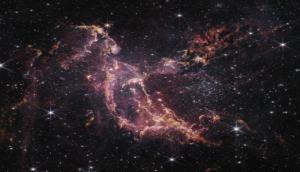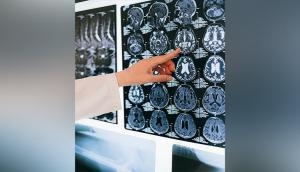
- \"We are going to see things that we never knew existed\' said scientists who announced the detection of gravitational waves.
- \"Ladies and gentlemen, we have detected gravitational waves finally. Einstein was so damn right. We finally did it!\"
- \"Finally, astronomy grew ears. We never had ears before,\" says one of LIGO scientists.
In what could be termed as the discovery of the century, a team of physicists announced on Thursday, 11 February that they had heard and recorded the sound of two black holes colliding a billion light-years away. This fleeting sound has fulfilled the last prediction of Einstein's general theory of relativity.
These gravitational waves i.e. ripples in space itself were discovered by University of Chicago physicists. The team played an important role in determining that the LIGO detectors had detected gravitational waves from the merger of two black holes, which collided to form a more massive, spinning black hole, as explained by University of Chicago.
The key discovery:
According to physicists, the faint rising tone is the first direct evidence of gravitational waves, the ripples in the fabric of space-time that Einstein predicted a century ago, as reported by The New York Times.
This also confirms the nature of black holes (Yep, you witnessed those in Interstellar, and also studied about them in your school days). And for those who don't understand what black holes are, here's a simple definition.
A black hole is a region in space where the pulling force of gravity is so strong that light is not able to escape. The strong gravity occurs because matter has been pressed into a tiny space.
The news is OMFGOMG brilliant:
The news implies that physicists and scientists have tapped into deepest secrets of physical reality as predicted by Albert Einstein and the results can be magnanimous and tremendous to say the least.
"We are all over the moon and back. Einstein would be very happy, I think," said Gabriela Gonzalez of Louisiana State University, a spokesperson for the LIGO Scientific Collaboration (Laser Interferometer Gravitational-Wave Observatory.)
Meanwhile, members of the LIGO group along with scientists from a European team known as the Virgo Collaboration published a report in Physical Review Letters on Thursday with more than 1,000 authors.
Here's what NYT had to say:
If replicated by future experiments, that simple chirp, which rose to the note of middle C before abruptly stopping, seems destined to take its place among the great sound bites of science, ranking with Alexander Graham Bell's "Mr. Watson - come here" and Sputnik's first beeps from orbit.
"I think this will be one of the major breakthroughs in physics for a long time. Everything else in astronomy is like the eye," said Szabolcs Marka, a Columbia University professor who is one of the LIGO scientists.
So, what is Albert Einstein's original Theory of General Relativity?
General relativity is the geometric theory of gravitation published by Albert Einstein in 1915 and the current description of gravitation in modern physics.
General relativity generalises special relativity and Newton's law of universal gravitation, providing a unified description of gravity as a geometric property of space and time, or spacetime. In particular, the curvature of spacetime is directly related to the energy and momentum of whatever matter and radiation are present.
What is LIGO?
LIGO is a system of two identical detectors carefully constructed to detect incredibly tiny vibrations from passing gravitational waves, was conceived and built by MIT and Caltech researchers, funded by the National Science Foundation, with significant contributions from other U.S. and international partners. The twin detectors are located in Livingston, Louisiana, and Hanford, Washington. Research and analysis of data from the detectors is carried out by a global group of scientists, including the LSC, which includes the GEO600 Collaboration, and the VIRGO Collaboration.
Watch the video here:
Also, what does the team of researchers have to say?
For scientists at UChicago, the finding speaks powerfully to their field's past and its exciting future.
"We've been dreaming about this for a long time," said LIGO collaborator Daniel Holz, associate professor in physics. "It's our first time ever seeing something like this, and it truly opens up a new chapter in physics. You don't get to do that very often."
In addition to providing the first observation of ripples in spacetime, the discovery is a dramatic confirmation that black holes are real, Holz said. "The physics community was convinced, but we've never seen one up close," he said.
"Now we're going right to the heart of these objects, from a billion light years away. These measurements leave little doubt that black holes exist."
Legendary UChicago physicist Subrahmanyan Chandrasekhar was the first to propose in 1930 that massive stars might collapse into objects like black holes-an idea that prominent physicists initially ridiculed.
As important as it is to validate the theories of Einstein and Chandrasekhar, the LIGO findings do much more than that, said Edward "Rocky" Kolb, dean of UChicago's Physical Sciences Division.
"This opens up a new window into the universe, to understand the most violent events that happen," Kolb said.
"We're in a great position at the University of Chicago to exploit this new opportunity. Using instruments like the Magellan Telescopes in Chile and the future Giant Magellan Telescope, in which UChicago is a founding partner, we will try to see the fireworks that should accompany what we've just heard through gravitational waves."
#Einstein was right! #LIGO scientists finally confirm the existence of #GravitationalWaves https://t.co/DoMwG2dDSD pic.twitter.com/J4OJL1YH0b
- Sputnik (@SputnikInt) February 11, 2016
Original documents related to #Einstein's prediction of gravitational waves are shown - https://t.co/qCItP18Ukw pic.twitter.com/U3Gf20fcJo
- AP Images (@AP_Images) February 11, 2016
This Einstein was a genius - maybe even more so than Kanye https://t.co/hKkEjAV6wz
- Jimmy Kimmel (@jimmykimmel) February 11, 2016
As usual, xkcd is here for us in our hour of nerd: https://t.co/6DdoCuRhl2 #gravitationalwaves #LIGO pic.twitter.com/vFDcnGPgbM
- Katie Mack (@AstroKatie) February 11, 2016
What makes #gravitationalwaves so exciting? #funwavefacts pic.twitter.com/gMK28JLbrU
- Institute of Physics (@PhysicsNews) February 11, 2016
Read the full text by University of Chicago here.
And if you are clued into Reddit and want more details, HERE'S THE MEGA THREAD. (You're welcome)
First published: 12 February 2016, 12:10 IST







![BJP's Kapil Mishra recreates Shankar Mahadevan’s ‘Breathless’ song to highlight Delhi pollution [WATCH] BJP's Kapil Mishra recreates Shankar Mahadevan’s ‘Breathless’ song to highlight Delhi pollution [WATCH]](https://images.catchnews.com/upload/2022/11/03/kapil-mishra_240884_300x172.png)

![Anupam Kher shares pictures of his toned body on 67th birthday [MUST SEE] Anupam Kher shares pictures of his toned body on 67th birthday [MUST SEE]](https://images.catchnews.com/upload/2022/03/07/Anupam_kher_231145_300x172.jpg)


_in_Assams_Dibrugarh_(Photo_257977_1600x1200.jpg)



